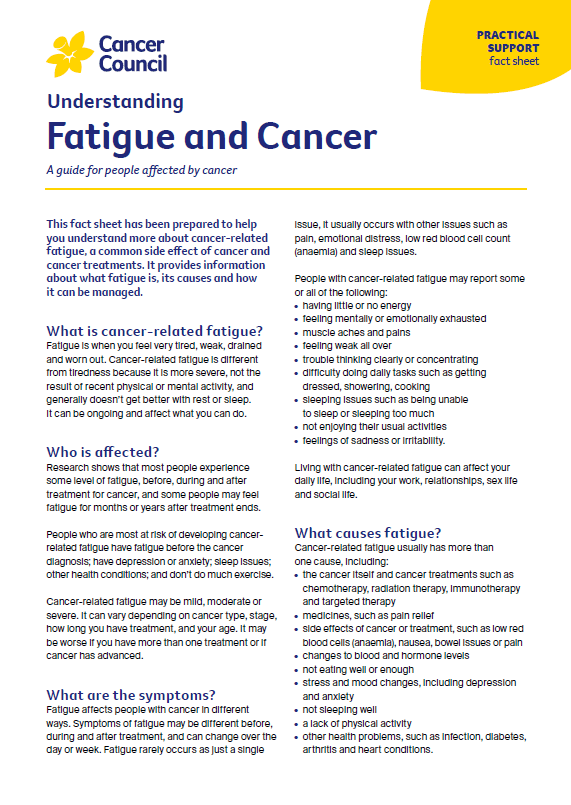- Home
- About Cancer
- Advanced cancer
- Living with advanced cancer
- Managing symptoms
- Sleeping problems
Sleeping problems
Getting enough sleep can help keep up your energy levels and improve your mood. Difficulty sleeping may be caused by pain, breathlessness, anxiety or depression. Some medicines, hormonal changes and nausea can also affect sleep. If you already had sleep problems before the cancer spread, these can become worse.
Talk to your doctor about whether your medicines need adjusting or sleep medicines may be an option.
Ways to improve sleep
- Try some gentle activity each day. A physiotherapist or exercise physiologist can plan an exercise program, and an occupational therapist can suggest equipment to move safely.
- Avoid drinking alcohol, having caffeine, smoking, and eating spicy food.
- Try not to use your TV, computer or smartphone before bed as the blue light may tell your body it’s time to wake up.
- Follow a regular bedtime routine and set up a calm sleeping environment.
- Keep the room dark, quiet and at a comfortable temperature.
- Relax with gentle music, rain sounds or Cancer Council’s Finding Calm During Cancer podcast before bed.
- If you can’t sleep, get up and sit on the couch until you feel sleepy again.
→ READ MORE: Managing fatigue caused by advanced cancer
Podcast: Sleep and Cancer
Listen to more episodes from our podcast for people affected by cancer
Dr Lucy Gately, Medical Oncologist, Alfred Health and Walter and Eliza Institute for Medical Research, VIC; Dr Katherine Allsopp, Supportive and Palliative Care Specialist, Westmead Hospital, NSW; A/Prof Megan Best, The University of Notre Dame Australia and The University of Sydney, NSW; Dr Keiron Bradley, Palliative Care Consultant, Medical Director Palliative Care Program, Bethesda Health Care, WA; Craig Brewer, Consumer; Emeritus Professor Phyllis Butow, Psychologist, The University of Sydney and Chris O’Brien Lifehouse, NSW; Louise Durham, Palliative Care Nurse Practitioner Outpatients, Princess Alexandra Hospital, Metro South Palliative Care, QLD; Dr Roya Merie, Radiation Oncologist, ICON Cancer Centre, Concord, NSW; Penny Neller, Project Coordinator, National Palliative Care Projects, Australian Centre for Health Law Research, Queensland University of Technology, QLD; Caitriona Nienaber, 13 11 20 Consultant, Cancer Council WA; Xanthe Sansome, Program Director, Advance Care Planning Australia, VIC; Sparke Helmore Lawyers; Peter Spolc, Consumer.
View the Cancer Council NSW editorial policy.
View all publications or call 13 11 20 for free printed copies.
